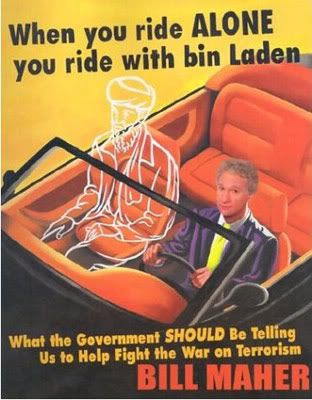Why The 'War on Terror' Is Not, And Never Has Been, Anything Like WWII
The immediate post-9/11 period was an interesting (and not always in the good way) time in America. Uber-patriotism ruled the day, with American flags flying off every stoop and car across the country. We stood behind our President as he sent our forces off to Afghanistan to get Osama bin Laden "dead or alive". We scratched our heads, but laughed it off, when he said we could defeat the terrorists by shopping our brains out. Previously intelligent, liberty-minded members of Congress passed something known as a Patriot Act. This cheery jingoism also seemed to find an enemy in dissent and freedom of speech. Bill Maher famously learned that the hard way when ABC canned him over a controversial remark about whether terrorists (or us) should be labeled cowards, even leading the White House press secretary to remark that Americans "need to watch what they say, watch what they do".
In 2002, Bill Maher- evoking the last American war that truly made sense- wrote a book entitled "When You Ride Alone You Ride With Bin Laden: What the Government Should Be Telling Us to Help Fight the War on Terrorism". In the book, Maher wrote in detail numerous suggestions for fighting terrorism, including better understanding why terrorists actually hate us, saner airport security, really addressing terror financing, and putting our national resources in perspective. He also lamented a lack of WWII-era sacrifice, like how our grandparents bought war bonds or saved tin and oil to help the war efforts. Our soldiers weren't fighting the war alone, the whole country fought the war. It prevented people from thinking about war passively (as we do now) and made the price of victory that much more earned. Such collective sacrifice and charity would be labeled "communist" by a conservative movement today that seems to insist the best way to support our troops is to put them out of our mind.
In the opening chapters, Maher summed up this devolving of what constitutes patriotism-
That's what this book is about: how we can all connect what we do on the home front to quicker victory here with fewer of our servicemen overseas...
...Of course, there are reasons why the American government no longer helps us make war-related connections, mostly having to do with where those connections might lead us politically. There's a World War II-era government poster that reads "Should brave men die so you can drive?"- a question we might well ask ourselves today. But don't count on the government to ask it, not in an age when campaign contributions from oil companies are so important to getting elected...
...Americans today confuse freedom with not being asked to sacrifice. The fact that you can't have everything you want exactly when you want it has become un-American. We'd rather sacrifice virgins than SUVs: "I'll guzzle as much gas as I want- this isn't Europe!" Sure you can, Captain America, but just imagine a World War II-era American saying "I'll use as much damn gas as I want- and while we're at it, screw your victory garden!" They'd call you "Axis Asshole". Somehow, America morphed from a nation that embraced rationing to one that practically impeached Jimmy Carter for having the nerve to suggest we turn down the thermostat and put on a sweater. Even in the wake of an event so invasive and frightening as September 11, not one person in a leadership position in America asked anyone to really give up or rethink anything. Pandering to a spoiled citizenry had become so ingrained, it remained in place even as buildings and complacencies crumbled. "Keep shopping!" the President told us, letting the political chips fall where they may.
"Shop till they drop!"
Yes, we were asked to do very little, and we responded. That's the bargain we tacitly make with our Presidents: we don't ask too much of you, if you don't ask too much of us...
...In World War II, the axis- the original one, not the cover band working today- had to fight every American, and they knew it. Civilians, and the level of support they give their protectors, make the difference in war time- a lesson we learned, or should have, in Vietnam...
What he said.
My grandmother tells me stories about WWII all the time; I enjoy them greatly. When we talk about current events, she is both angry and confused. She tells me that all in her long life, she has never seen anything like this presidency, and this woman lived through the Great Depression and the Cold War. As she might say to Bush's current war(s) and his attempts to morph it into WWII, "War on terror, I lived with WWII, I knew WWII, WWII was a friend of mine. War on terror, you are no WWII."



0 Comments:
Post a Comment
<< Home